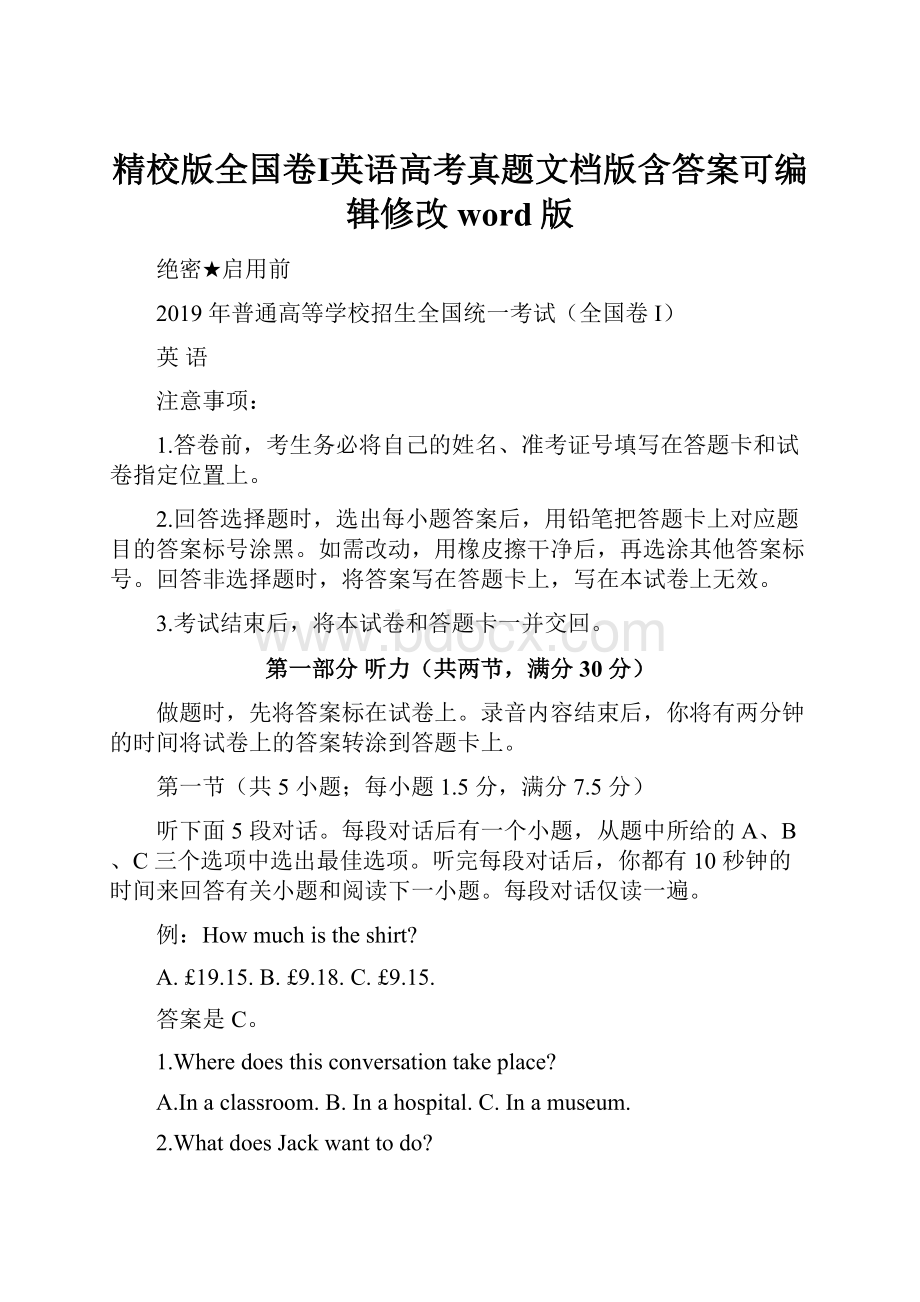精校版全国卷Ⅰ英语高考真题文档版含答案可编辑修改word版.docx
《精校版全国卷Ⅰ英语高考真题文档版含答案可编辑修改word版.docx》由会员分享,可在线阅读,更多相关《精校版全国卷Ⅰ英语高考真题文档版含答案可编辑修改word版.docx(17页珍藏版)》请在冰豆网上搜索。

精校版全国卷Ⅰ英语高考真题文档版含答案可编辑修改word版
绝密★启用前
2019年普通高等学校招生全国统一考试(全国卷I)
英语
注意事项:
1.答卷前,考生务必将自己的姓名、准考证号填写在答题卡和试卷指定位置上。
2.回答选择题时,选出每小题答案后,用铅笔把答题卡上对应题目的答案标号涂黑。
如需改动,用橡皮擦干净后,再选涂其他答案标号。
回答非选择题时,将答案写在答题卡上,写在本试卷上无效。
3.考试结束后,将本试卷和答题卡一并交回。
第一部分听力(共两节,满分30分)
做题时,先将答案标在试卷上。
录音内容结束后,你将有两分钟的时间将试卷上的答案转涂到答题卡上。
第一节(共5小题;每小题1.5分,满分7.5分)
听下面5段对话。
每段对话后有一个小题,从题中所给的A、B、C三个选项中选出最佳选项。
听完每段对话后,你都有10秒钟的时间来回答有关小题和阅读下一小题。
每段对话仅读一遍。
例:
Howmuchistheshirt?
A.£19.15.B.£9.18.C.£9.15.
答案是C。
1.Wheredoesthisconversationtakeplace?
A.Inaclassroom.B.Inahospital.C.Inamuseum.
2.WhatdoesJackwanttodo?
A.Takefitnessclasses.B.Buyapairofgymshoes.C.Changehisworkschedule.
3.Whatarethespeakerstalkingabout?
A.Whattodrink.B.Wheretomeet.C.Whentoleave.
4.Whatistherelationshipbetweenthespeakers?
A.Colleagues.B.Classmates.C.Strangers.
5.WhyisEmilymentionedintheconversation?
A.Shemightwantaticket.B.Sheislookingfortheman.C.Shehasanextraticket.
第二节(共15小题;每小题1.5分,满分22.5分)
听下面5段对话或独白。
每段对话或独白后有几个小题,从题中所给的A、B、C三个选项中选出最佳选
项。
听每段对话或独白前,你将有时间阅读各个小题,每小题5秒钟;听完后,各小题将给出5秒钟的作答时间。
每段对话或独白读两遍。
听第6段材料,回答第6、7题。
6.HowlongdidJamesrunhisbusiness?
A.10years.B.13years.C.15years.
7.HowdoesthewomanfeelaboutJames’situation?
A.Embarrassed.B.Concerned.C.Disappointed.
听第7段材料,回答第8至10题。
8.WhathasKate’smotherdecidedtodo?
A.Returntoschool.B.Changeherjob.C.Retirefromwork.
9.WhatdidKate’smotherstudyatcollege?
A.Oilpainting.B.Arthistory.C.Businessadministration.
10.WhatisKate’sattitudetowardhermother’sdecision?
A.Disapproving.B.Ambiguous.C.Understanding.
听第8段材料,回答第11至13题。
11.Whatisthemandoing?
A.Chairingameeting.B.Hostingaradioprogram.C.Conductingajobinterview.
12.WhatbenefitsMarymostinherjob?
A.Herwidereading.B.Herleaders’guidance.C.Herfriends’help.
13.WhowillMarytalkaboutnext?
A.Herteacher.B.Herfather.C.Hermother.
听第9段材料,回答第14至17题。
14.Whydoesthemanseldomdoexercise?
A.Helacksmotivation.B.Hehasaheartproblem.C.Heworksallthetime.
15.WhatdoesJacobSattelmairprobablydo?
A.He’sanathlete.B.He’saresearcher.C.He’sajournalist.
16.Whydoesthewomanspeakofastudy?
A.Toencouragetheman.B.Torecommendanexercise.C.Tosupportherfindings.
17.Howmuchtimewillthemanprobablyspendexercisingweekly?
A.300minutes.B.150minute.C.75minutes.
听第10段材料,回答第18至20题。
18.Whatdidthescientistsdototheroad?
A.Theyrepairedit.B.Theypaintedit.C.Theyblockedit
19.Whyareyoungbirdsdrawntotheroadsurface?
A.It’swarm.B.It’sbrown.C.It’ssmooth.
20.Whatisthepurposeofthescientists’experiment?
A.Tokeepthebirdsthereforawholeyear.
B.Tohelpstudentsstudythebirdswell.
C.Topreventthebirdsfrombeingkilled.
第二部分阅读理解(共两节,满分40分)
第一节(共15小题;每小题2分,满分30分)
阅读下列短文,从每题所给的A、B、C和D四个选项中,选出最佳选项。
A
NeedaJobThisSummer?
Theprovincialgovernmentanditspartnersoffermanyprogramstohelpstudentsfindsummerjobs.Thedeadlinesandwhatyouneedtoapplydependontheprogram.
Notastudent?
Gotothegovernmentwebsitetolearnaboutprogramsandonlinetoolsavailabletohelppeopleunder30buildskills,findajoborstartbusinessesallyearround.
JobsforYouth
Ifyouareateenagerlivingincertainpartsoftheprovince,youcouldbeeligible(符合条件)forthisprogram,whichprovideseightweeksofpaidemploymentalongwithtraining.
Whoiseligible:
Youth15—18yearsoldinselectcommunities(社区).
SummerCompany
SummerCompanyprovidesstudentswithhands-onbusinesstrainingandawardsofupto$3,000tostartandruntheirownsummerbusinesses.
Whoiseligible:
Studentsaged15—29,returningtoschoolinthefall.
StewardshipYouthRangerProgram
YoucouldapplytobeaStewardshipYouthRangerandworkonlocalnaturalresourcemanagementprojectsforeightweeksthissummer.
Whoiseligible:
Studentsaged16or17attimeofhire,butnotturning18beforeDecember31thisyear.
SummerEmploymentOpportunities(机会)
ThroughtheSummerEmploymentOpportunitiesprogram,studentsarehiredeachyearinavarietyofsummerpositionsacrosstheProvincialPublicService,itsrelatedagenciesandcommunitygroups.
Whoiseligible:
Studentsaged15orolder.Somepositionsrequirestudentstobe15to24orupto29forpersonswithadisability.
21.WhatisspecialaboutSummerCompany?
A.Itrequiresnotrainingbeforeemployment.
B.Itprovidesawardsforrunningnewbusinesses.
C.Itallowsonetoworkinthenaturalenvironment.
D.Itoffersmoresummerjobopportunities.
22.WhatistheagerangerequiredbyStewardshipYouthRangerProgram?
A.15—18.B.15—24.C.15—29.D.16—17.
23.Whichprogramfavorsthedisabled?
A.JobsforYouth.B.SummerCompany.
C.StewardshipYouthRangerProgram.D.SummerEmploymentOpportunities.
B
ForCanaanElementary’ssecondgradeinPatchogue,N.Y.,todayisspeechday,andrightnowit’sChrisPalaez’sturn.The8-year-oldisthejokeroftheclass.Withshiningdarkeyes,heseemslikethekindofkidwhowouldenjoypublicspeaking.
Buthe’snervous."I’mheretotellyoutodaywhyyoushould…should…"Christripsonthe"-ld,"apronunciationdifficultyformanynon-nativeEnglishspeakers.Histeacher,ThomasWhaley,isnexttohim,whisperingsupport."…Votefor…me…"Exceptforsomestumbles,Chrisisdoingamazinglywell.Whenhebringshisspeechtoaniceconclusion,Whaleyinvitestherestoftheclasstopraisehim.
Asonofimmigrants,ChrisstartedlearningEnglishalittleoverthreeyearsago.Whaleyrecalls(回想起)howatthebeginningoftheyear,whencalledupontoread,Chriswouldexcusehimselftogotothebathroom.
LearningEnglishasasecondlanguagecanbeapainfulexperience.Whatyouneedisagreatteacherwholetsyoumakemistakes."Ittakesalotforanystudent,"Whaleyexplains,"especiallyforastudentwhoislearningEnglishastheirnewlanguage,tofeelconfidentenoughtosay,‘Idon’tknow,butIwanttoknow.’"
Whaleygottheideaofthissecond-gradepresidentialcampaignprojectwhenheaskedthechildrenonedaytoraisetheirhandsiftheythoughttheycouldneverbeapresident.Theanswerbrokehisheart.Whaleysaystheprojectisaboutmorethanjustlearningtoreadandspeakinpublic.Hewantsthesekidstolearntoboast(夸耀)
aboutthemselves.
"Boastingaboutyourself,andyourbestqualities,"Whaleysays,"isverydifficultforachildwhocameintotheclassroomnotfeelingconfident."
24.WhatmadeChrisnervous?
A.Tellingastory.B.Makingaspeech.
C.Takingatest.D.Answeringaquestion.
25.Whatdoestheunderlinedword"stumbles"inparagraph2referto?
A.Improperpauses.B.Badmanners.C.Spellingmistakes.D.Sillyjokes.
26.WecaninferthatthepurposeofWhaley’sprojectisto.
A.helpstudentsseetheirownstrengths
B.assessstudents’publicspeakingskills
C.preparestudentsfortheirfuturejobs
D.inspirestudents’loveforpolitics
27.WhichofthefollowingbestdescribesWhaleyasateacher?
A.Humorous.B.Ambitious.C.Caring.D.Demanding.
C
Asdataandidentitytheftbecomesmoreandmorecommon,themarketisgrowingforbiometric(生物测量)technologies—likefingerprintscans—tokeepothersoutofprivatee-spaces.Atpresent,thesetechnologiesarestillexpensive,though.
ResearchersfromGeorgiaTechsaythattheyhavecomeupwithalow-costdevice(装置)thatgetsaroundthisproblem:
asmartkeyboard.Thissmartkeyboardpreciselymeasuresthecadence(节奏)withwhichonetypesandthepressurefingersapplytoeachkey.Thekeyboardcouldofferastronglayerofsecuritybyanalyzing
thingsliketheforceofauser’stypingandthetimebetweenkeypresses.Thesepatternsareuniquetoeachperson.Thus,thekeyboardcandeterminepeople’sidentities,andbyextension,whethertheyshouldbegivenaccesstothecomputerit’sconnectedto—regardlessofwhethersomeonegetsthepasswordright.
Italsodoesn’trequireanewtypeoftechnologythatpeoplearen’talreadyfamiliarwith.Everybodyusesa
keyboardandeverybodytypesdifferently.
Inastudydescribingthetechnology,theresearchershad100volunteerstypetheword"touch"fourtimesusingthesmartkeyboard.Datacollectedfromthedevicecouldbeusedtorecognizedifferentparticipantsbasedonhowtheytyped,withverylowerrorrates.Theresearcherssaythatthekeyboardshouldbeprettystraightforwardto
commercializeandismostlymadeofinexpensive,plastic-likeparts.Theteamhopestomakeittomarketinthenearfuture.
28.Whydotheresearchersdevelopthesmartkeyboard?
A.Toreducepressureonkeys.B.Toimproveaccuracyintyping
C.Toreplacethepasswordsystem.D.Tocutthecostofe-spaceprotection.
29.Whatmakestheinventionofthesmartkeyboardpossible?
A.Computersaremucheasiertooperate.
B.Fingerprintscanningtechniquesdevelopfast.
C.Typingpatternsvaryfrompersontoperson.
D.Datasecuritymeasuresareguaranteed.
30.Whatdotheresearchersexpectofthesmartkeyboard?
A.It’llbeenvironment-friendly.B.It’llreachconsumerssoon.
C.It’llbemadeofplastics.D.It’llhelpspeeduptyping.
31.Whereisthistextmostlikelyfrom?
A.Adiary.B.AguidebookC.Anovel.D.Amagazine.
D
Duringtherosyyearsofelementaryschool(小学),Ienjoyedsharingmydollsandjokes,whichallowedmetokeepmyhighsocialstatus.Iwasthequeenoftheplayground.Thencamemytweensandteens,andmeangirlsandcoolkids.Theyroseintheranksnotbybeingfriendlybutbysmokingcigarettes,breakingrulesandplaying
jokesonothers,amongwhomIsoonfoundmyself.
Popularityisawell-exploredsubjectinsocialpsychology.MitchPrinstein,aprofessorofclinicalpsychologysortsthe